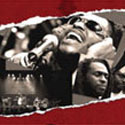
Door of No Return
directed by Michel Moreau
starring Steel Pulse circa 1999
Wiseman Doctrine

The House of Slaves is an ominously, but accurately, named testament to human injustice that still stands on Goree Island, just off the coast of Dakar, Senegal. During the slave trade, it served as a loading station to send slaves from the West Coast of Africa across the Atlantic. In Door of No Return, Steel Pulse visits Goree Island during their 1999 trip to Dakar, and the story hinges on this experience. In a way, this documentary is about a band trying to re-discover itself after losing direction on its own difficult passage.
Steel Pulse’s first album, Handsworth Revolution, was committed to wax in 1978. Named for their hometown of Handsworth in Birmingham, England, it featured aggressive reggae fused with spunky guitars and divergent breakdowns. David Hinds, Steel Pulse’s leader for the last 30 years, with his stovepipe dreads and punky dress, distinguished Steel Pulse from their reggae forbears – no doubt a result of cross-pollination between themselves and the rock bands they shared stages with during the early days of their career: Generation X, The Stranglers, The Police, and XTC. Unlike their D.C. counterparts, Bad Brains, who segregated their contradictory rock and reggae halves, Steel Pulse subsumed rock and girded the foundation of their reggae with its propulsive energy. Visionary enough to pick up the pace alongside the surging punks, tracks like their indictment against racism, “Ku Klux Klan,” had a sonic synergy with early Police (who opened for the band in the early days), while maintaining the radical philosophies and pointed roots lyrics of Burning Spear. They were British kids with Jamaican roots whose music expressed their outlook and outrage in the style of their ancestors’ music, while intertwining with the punk movement bursting out of the U.K. in the 1970s.
But Door of No Return assumes that you already know all of this, or that you really don’t care. This ain’t no concert documentary on ’70s U.K. punk/reggae, or Steel Pulse’s position in it. For that, you’d have to check out Who Shot the Sheriff?, Ugh! A Music War, or even Reggae in Babylon. That may just be my personal bias, but I think there is room for some of that here. Instead of the past, Door of No Return gives us a globally minded and contemplative Steel Pulse, gigging in Africa at an Amnesty International concert celebrating the 50th Anniversary of the Declaration of Human Rights in Senegal, a benefit to raise money for a health center in a town called Woudourou. We also get typical road-life as the band bops from concerts in Virginia to Colorado, inter-cut with interviews about their thoughts on international peace, love, and unity. This is Steel Pulse after their pop-heavy albums like Victims and State of Emergency, Steel Pulse in the wake of their many missteps: gobbled up then spit out by industry giants like MCA, slogging through the nadir of post-Marley reggae. In the past, Hinds has made no bones about seeking a platinum album breakthrough, straying from the pointed and militant sound of classics like Tribute to the Martyrs or True Democracy.
From a packaging standpoint, Door of No Return has little bonus material, only additional concert footage of two songs, one of which, “Ravers,” doesn’t play in its entirety. The concert footage in the documentary is generally good, but only features a few full performances of later era tracks like “Black Enough for You” and “Steppin’ Out.” So, as a document of the band, Door of No Return has little value unless you are a die-hard fan or a lover of fortune cookie, feel good reggae.
It’s standard music doc stuff until we tour the grounds of Goree Island and the band comes full circle on their journey as Englishmen born of Jamaican parents who are of African descent who arrived in the Caribbean as a result of gateways like the House of Slaves and arrive back in Africa as a result of speaking about such atrocities in their music. Hinds seems to be renewed by the experience. ‘Door of No Return’ is the title to a song off of Steel Pulse’s 2004 album, African Holocaust, which marks something of a return to the band’s roots as a consciousness-first progressive reggae band.
Shortly after visiting Goree Island, we see Hinds in the studio penning the lyrics: “Then all of a sudden I was in a state of shock/ Caught and thrown on the auction block/ Just like Jesus flogged and mocked/ Now human cargo, yes, they said I wasn’t coming back.” It’s a poignant moment, seeing Hinds reconnect in a visceral way with subject matter and focus that once defined the band, but will the real Steel Pulse ever be coming back? After suffering at the hands of major labels and the quest for number one hits, they’ve made a decision to turn back to their roots. Slowly, the band may be finding their way.
Steel Pulse: http://www.steelpulse.com/ ◼












